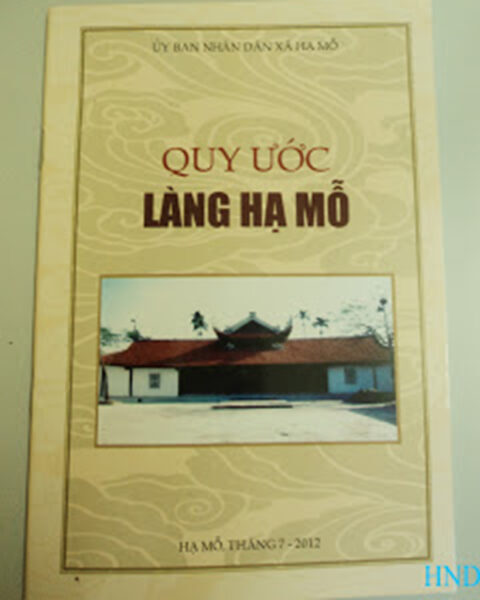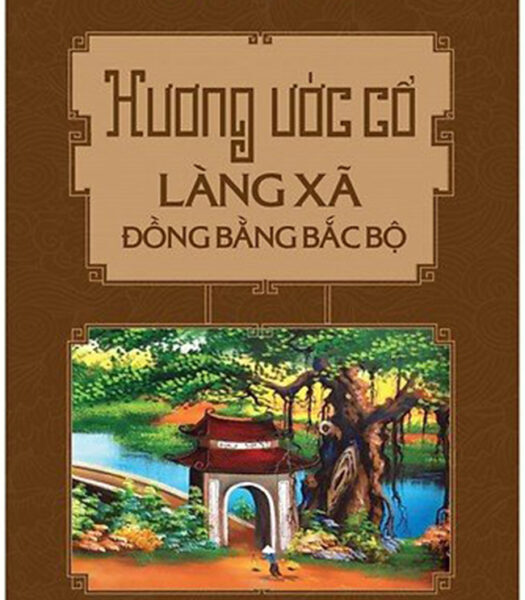
Conventions by Dai Mo village, Dan Phuong, Hanoi – Illustrative image – Source: internet
Village regulations are the first “legal documents” of the villages to contribute to the stabilization of relationships in the community society.
Village regulation is a term of Chinese origin and still retains its original meaning when it was introduced to Vietnam. Village regulations are conventions and regulations of a community living together in a residential area such as a village or commune. The village regulations record rules (general rules of conduct) that are mandatory to comply with, related to community life. These regulations have gradually formed in history, adjusted and supplemented as necessary. And the village regulations are the first “legal document” of the villages and communes to contribute to the harmonization of relationships in the community society. In the history of Vietnam, along with the legal system, the village regulations and conventions supplement some limitations of legal documents, especially those that are too specific and detailed, or some legal issues that are difficult to intervene; contribute to preserving many traditional cultural features.
Around the end of the seventeenth century, village regulations became quite popular in the system of villages and communes in Vietnam. Depending on different villages, village regulations are also known by different names such as huong khoan, huong le, khoan uoc, khoan le, treaties and regulations. Most of the village regulations mentioned the main contents such as: security and order, behavioral relations, public interests, rewards and punishments, also the specific duties of children towards parents, grandparents, and wives to my husband, the older siblings to the younger ones, etc.
Currently, the whole country has more than 100,000 copies of village regulations and conventions that have been approved by competent authorities, which shows the importance of these documents in social life. It is a necessary customary law system in modern society, not only not in opposition but also as a useful complement to the legal system to regulate social relationships, unite the population, abolish customs, and maintain a civilized way of life, lifestyle, and manners, etc.
Promoting the effectiveness of village regulations, conventions and traditional cultural values in building elegant and civilized Hanoians
According to researchers, many localities of old Hanoi have their own village regulations and conventions that are still preserved. For example, the village regulations of Dinh Cong Thuong, Khuong Dinh, Thanh Tri district, Ha Dong province (currently known in Hoang Mai district, Hanoi) established in 1923 has all the articles on socio-political issues such as organization of associations, councils, methods of election, tax collection, events, vigilance in the village, watch in the fields, first aid, sanitation, etc., and articles of custom governing the land, weddings, funerals, sacrifice, desire, level, etc. Or, the custom of La Noi commune, Ỷ La (currently known in Duong Noi ward, Ha Dong district) lists the wishes on worshiping the god of blessings, nobles and honors, farming, banning gambling, preventing theft, maintaining security, etc.
The village regulations of Tien Tien village in Phuong Hanh, Chuong My district, Ha Dong province (currently known in Xuan Mai town, Chuong My district, Hanoi) includes 127 articles, including some very specific provisions, etc. The village regulations of Xa Mac village, Yen Lac district, Phuc Yen province (currently known in Xa Mac commune, Me Linh district, Hanoi) stipulates responsibility for the safety of communities and villages, with the following clearly stated: “In the cases of pillage and dyke landslide, except for those 60 years of age or older and the weak, and the villagers who heard the signal must immediately come to the rescue, if anyone is too lazy to come to the rescue, the village management board shall judge the food and punish them from 2 to 5 haos”… In addition, some villages of ancient Hanoi such as Bat Trang village (Gia Lam), Dong Ngac village (Bac Tu Liem)… or the people who make silver carving, silver casting on Hang Bac street… They all set up their own village regulations and conventions.

Book cover of Ancient conventions of villages in the Northern Delta – Illustrative image – Source: internet
Today, most localities across the city have built village regulations and conventions based on the village regulations and conventions of old villages, communes and wards, but with adjustments and supplements to suit modern life. Especially, since Hanoi city launched the campaign “All people unite to build a cultural life”, many contents of the Campaign have been included in the regulations of many localities and are considered as actively contribute to building cultural life such as Regulations on behavior between family and society; about dumping garbage in public places or the responsibility of citizens to the community; regulations on civilized practice in marriage and mourning; regulations on building study promotion funds; regulations on family members respecting each other…
In addition to the positive aspects, the village regulations and conventions also have some limitations and are not suitable. In the old days, village regulations and conventions emphasized the autonomy of the community but ignored some provisions of the law. Today’s village regulations, although there have been many innovations, in some localities still put into the convention, village regulations that are not suitable for modern society, even, against the provisions of the law. For example, the fact that some conventions show inequality against women when stipulating that women are not allowed to participate in some community activities; men who cannot give birth to a son are not entitled to some rights, or some conventions are still burdened with many customs, especially in festivals and religious activities.
Therefore, to promote the role of village regulations and conventions in building modern life, it is necessary to review, amend, supplement or build new ones in areas where there are no regulations or conventions. In early April 2018, the Hanoi People’s Committee issued Official Letter No. 2175/UBND-NC on reviewing, amending and supplementing village regulations and conventions in the city. The official dispatch requests the People’s Committees of districts, towns of the city to organize the review, amendment, supplementation or promulgation of village regulations and conventions to ensure that the contents are consistent with the provisions of the Constitution on human rights, citizenship, ensuring the implementation of democracy at the grassroots. The content of village regulations and conventions must not contravene the provisions of law, contributing to building a civilized lifestyle and a cultural family. However, the development of village regulations and conventions needs to strictly follow the process of reviewing, amending and supplementing accordingly or building new ones. To do this, it is necessary to have the participation of the community, the judicial branches of the localities to work together closely in the construction and review work. Contents that do not match the spirit of the campaign “All people unite to build a cultural life”, especially illegal content should be removed. Besides, it is also necessary to add new regulations to the village regulations and conventions.
Most recently, Program No. 06-CTr/TU of the Hanoi Party Committee on “Cultural development; improving the quality of human resources; building elegant and civilized Hanoi people in the 2021-2025 period” also set the task: Promoting the effectiveness of conventions, village regulations and traditional cultural values in building elegant & civilized Hanoians.
To perform this task well, in the coming years, Hanoi will review the village regulations and conventions in the city, promote the self-governing role of villages and neighborhood groups in protecting, preserving and developing the traditional cultural values, good customs and habits; limit and step by step eliminate outdated customs in the city; effectively handle and prevent the phenomena and behavior of degraded morals and lifestyles; repel negativity and social evils; fight to eliminate harmful cultural products, negative acts, violate the law, spread wrong ideas, lifestyle contrary to fine customs and traditions, adversely affect the image of Hanoi people.
Nhat Linh

